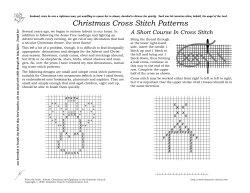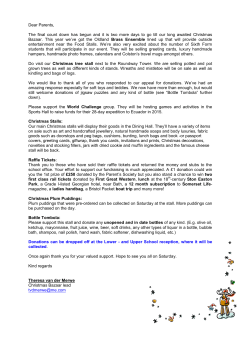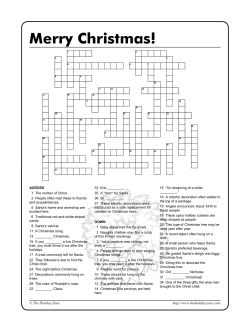
Et Cetera Jason Segel and Me In Praise of Interdisciplinary Studies
1 Christianity & the Arts Regent & the Global Community Ratio et Fides Christianity & the Marketplace Church Leadership Living out Justice Community Life Knowing God Et Cetera generating ideas . fostering dialogue . renewing community January 22, Winter Issue 2 In Praise of Interdisciplinary Studies -Barnabas Aspray Jason Segel and Me -Ryan Kelley I began this term in low spirits, and it is probably safe to say to that my One of the hardest things about malaise was not without warrant. With the Regent experience is all the missed my time at Regent swiftly coming to opportunities – all the courses you can’t an end, my life was singularly without take because you’re taking other courses, direction or even a potential way all the social events you can’t go to because forward: I did not have a job; my course you’re studying, all the study you fail to do because you are at social events. There are so load was uncharacteristically light, and my soul was not particularly piqued many fascinating-sounding courses on the timetable, and as if that in itself were not bad to do anything of great worth after I enough, everybody has a pet course that they cross that stage in early May with a tell you “you MUST take” or a professor “you peculiarly expensive piece of paper. So, I took to doing what any normal, white, MUST study with” before you leave Regent. middle-class North-American does Your experience isn’t complete without it! in such a predicament—I performed I’m going to offer one small bit repeated acts of self-flagellation by of advice which isn’t focused on how to complete your “Regent Experience” but about way of applying as many words of how to be fruitful in using your education for disapprobation as I possibly could to the rest of your life. This applies especially to my less than exemplary condition. I was: listless, inert, torpid, slothful, academically-minded people, but I think in indolent, lazy, sluggish, lethargic, and some degree to everyone. idle. Why was I doing nothing in this Be interdisciplinary! If not in your world? Truthfully, the most appropriate programme concentration, then “in explanation would have been that I was instinct” (as Iain Provan once said to too busy playing a magnificently prolix me). One of Regent’s great strengths is its game of self-pity. multidisciplinary approach, with a wide Anyways, when the pleasure of base of core courses in many subject areas. the lexical mopery finally subsided, I Not every institutional institution offers this advantage. It’s worth taking full advantage of decided to make use of the remaining days of my free one-month trial of while we’re here. Netflix by watching the last two films Why is being interdisciplinary an of Jason Segel’s oeuvre that I had yet advantage? Because, as my Dad once told to see: The Five-Year Engagement me, the most valuable insights usually and Jeff, Who Lives At Home. As I come at the intersection of different areas saw it, there were two salient reasons of expertise. It is the collision of otherwise for choosing this course rather than separate worlds that enriches each world in another (if it weren’t so, I could have a fresh and unique way. The totality of truth is not found in any one subject: no, not even concentration. While everyone else uses philosophy / theology / history / biblical studies (gasp!). Each of them falls eventually the normal tools of the trade to answer into error without the stabilizing force of the the normal questions, you’ll have a unique angle. It will make you stand others. out. There are many examples of this. Also, don’t compartmentalize. Don’t In the 1980s Robert Alter said, “what keep your knowledge of history in one part of your head and your theological knowledge would happen if we read the Bible as literature?” and changed the face of in another. See how one applies to the biblical scholarship. In the same way, other, how it changes the angle from which let’s ask creative questions, like “what you understand it. Imagine how the latest would we learn if we investigated the economic / sociological / psychological / sociology of the early church?” (Rodney neuro-arachnoneurological research could Stark) or “what would it be like to think apply to soteriology or Mariology. hermeneutically about the history of Don’t fight disciplinary wars. Don’t doctrine?” (Anthony Thiselton) or “how entrench yourself in one side of the debate did the economics of Old Testament law between theology and biblical studies, or between analytic and continental philosophy. really work?” (Paul Williams). The world God created is big and It is unlikely that one side has got it entirely complex and multi-faceted. Everything wrong and just never noticed. flows in and out of everything else, and You may find, if you apply one discipline to another, that you become one of there are endless angles on the smallest subject. God gave us not one eye but the more interesting people in your chosen two, so all our vision can have the three- just as easily decided to delve into Gilbert Godfrey’s back-catalogue). The first was obviously Mr. Segel’s ineluctable charm. Secondly, this particular man’s brand of humor was constructive, not destructive. Jason Segel never takes the piss out of someone for a burst of facile giggles. Rather, he brings both smiles and laughter through his undaunted expression of hope, love, and forgiveness in a world that has precious little time for such humane virtues. (The warp and woof of his comedic approach, by way of digression, was woven early via his childhood exposure to The Muppets. He lucidly explores their influence upon his career in the commentary track on The Muppets [2012] DVD.) The first film, The Five-Year Engagement, was a bad choice. It follows the story of Tom (Segel) and Violet (Emily Blunt) as they attempt to solidify their love in the form of holy matrimony. Yet, the exigencies of life intrude resulting in Tom surrendering his dreams to accommodate those of his fiancée. The result is that most of the 124 minute movie depicts the slow, painful declension of Tom into purposelessness and outré facial hair cultivation. No bueno. Disheartened, but spurred on by my unflagging desire for completion, I buffered the second of the two films as I steeped my fifth cup of Tension Tamer tea. (Continued on pg. 3) dimensional depth of two combined points of view. God gave us not one ear but two so that we may, as a confluence of traditions, bring a unique perspective to the world. Et Cetera welcomes your input. Article submission guidlines can be found on p. 4 2 January 22, Winter Issue 2 Regent Recycling Rant -Alec Arnold I have absolutely had it up to here with Rick Smith and the Regent Facilities crew! I mean, sure, they’re witty (and attractive), but what the heck are those guys doing about ecological responsibility? Even kindergarten classes are able to implement recycling programs, but Regent seems a bit slow on the uptake, don’t you think? Oh oh oh wait a minute. I forgot. I forgot about those stainless steel monstrosities, standing like monoliths of… what exactly? Rick calls them “Recycling Centres.” More like “Ridiculous Centres!” In fact, I honestly don’t know of a Regent student who can make heads or tails of them. Can you? First off, there’s four spots I have to deal with. FOUR! I’m standing there, holding the “leftovers” of my caramel macchiato, dumbfounded with what to do with my cup... because what’s staring back at me? Four different bins that I now have to decode. Why not make it a million?! How am I supposed to choose which one my cup goes in, Rick? Answer me that. Now, I admit. There’s clearly some kind of “sign” on or above each of those little compartments, but they’re entirely incomprehensible. The font is so big—it offends my aesthetic vision. One of them says: “Clean Paper.” What does that mean? I did an etymological study last term on Hebraic usage of the word ‘clean’ but that doesn’t really do much good for me and my coffee cup. So I figure: Well, my cup’s made of paper. It’s half full of coffee, but I didn’t spit in it…so… clean enough! Toss ‘er in. Another one of those bins says something like: “Plastic.” Does that include my granola bar wrappers or not? Banana peel? Hands down, it’s the “Compost” bin that’s most bamboozling… I mean yeah, I know they posted a list describing in detail what goes in this bin, but come on guys, how long do you expect me to stand there reading all these words?! Maybe I should sign up for hermeneutics! Which reminds me, doesn’t Facilities know I’m already late for class as it is? Do they seriously expect me to spend .56 seconds reading all these textual mysteries? I’ve got bigger fish to fry, Rick Smith! Besides class, I’ve got a paper on creation care due this afternoon. Oh forget it, I’ll just throw everything into the “Garbage” bin. That’ll learn ‘em. After all, if I’m the one that has to do all this work sorting my own waste in these bins, why not just hire me as a janitor too? Next thing you know they’ll expect me to wash my own dishes in the kitchen! If Regent really wanted to protect the planet they should simplify all this “Recycling Centre” cryptology. Why make it so hard on us? This is Regent College, not some smarty pants think-tank. I hereby make a motion that Rick and the Facilities crew dumb it down for us because nobody can seem to learn this system without a PhD…evidently. Twelve Days of Christmas -Thomas Bergen “Why does Regent start so late in January?” I heard no end to such envious complaints from my undergraduate friends from UBC (not least my fiancé!) who went back to school on January 2nd. I retorted, “Why did your school start so early?”, but after being told that it was due to UBC students’ superior studiousness and Regent College students’ laziness—and having no witty come-back ready—I knew I had to come up with something better. I had to come up with something with the clear ring of a Regent rational; something more theological. I discovered my answer in the notion of liturgical time. Apparently the 12 days of Christmas are more than the name of a Christmas carol. When the workaday world went back to business after New Years Day, how appropriate that Regent College students were still celebrating the 12 days of Christmas which lasted from the Feast of the Nativity (December 25) to the Feast of the Epiphany (January 6). During the Middle Ages, the 12 days of Christmas were a merrymaking marathon which climaxed on the Twelfth Night. (And yes, you are right to catch the William Shakespeare reference.) I bet that most of the Christians who sniff a cultural conspiracy to eradicate Christmas in every “happy holidays” and “season’s greetings” card are not even aware that 10 of the 12 days of Christmas have already been effectively wiped from our memories. While we all lament the commercialization of Christmas, we strengthen the association between celebrating Christmas and opening gifts by restricting the celebration of Christmas to December 24 and 25. Unwrapping gifts equals wrapping-up Christmas. Have you ever noticed how the push to cleanup Christmas begins almost immediately after the 25th? People who leave their Christmas trees and lights up into January gain the same disapproval as people who listen to Christmas carols in November. (Incidentally, most of the choirs I’ve been a part of start rehearsing for Christmas concerts in September.) I think that New Years Eve is the biggest culprit that truncates the Christmas season. Smack in the middle of Christmastide (the 12 days of Christmas) is this other “holiday” which is in fact not a “holy day” at all. The other contender is of course boxing day which whiplashes us back into a shopping frenzy after the silent and holy night of Christmas. What we have with New Years and Boxing Day in the midst of Christmastide is the clashing of times, with liturgical time being trumped by secular time. So here’s what I told my envious enquiring UBC student friends: Regent is simply conforming its course calendar to the liturgical calendar. Here at Regent College we know which calendar is the most important – and it just so happens to give us more time off! Admittedly we started classes well after the Feast of Epiphany on January 6... so I guess we had a bit of a liturgical holiday hang-over. More seriously though, I think that our lives are governed too much by the clocks of the world - the punch clock, the due date clock, the appointment book, the federal “holidays.” The great thing about the liturgical calendar is that it orients us to a different standard of time. Our attitude towards Christmas and other holidays should go beyond the excitement of having time “off”. Liturgical time is more than just the lag time between work days. Christian holidays create a “sanctuary in time”, to use Abraham Heschel’s expression about the Jewish observance of the Sabbath. That might be something to remember when we celebrate Easter during finals! I still haven’t found a satisfactory justification for our 2 week-long reading breaks vs. UBC’s one-day reading break day in the fall semester. Let me know if you have any ideas. ‘So Poetry’ -Steve Davis So poetry will be my joy then, poetry, and the God of it, to hear Him sing, sing through its lines, and through the sense of it, the sense and the sound of it, and sing through the world of it, and to sing through me. Then will I hear, see, take what I find there and bring, sing it swift, straight into the space where action blooms, the space where love blooms, blossoms to the works of it, the works and labours of it, love. Loved for the sake of it, for He sings through all. 3 January 22, Winter Issue 2 (Segel cont.) Now, knowing the premise of Jeff, Who Lives at Home beforehand, I had braced. myself for another round of gut-kicking melancholia. The story revolves around two brothers, one a ne’er-do-well stoner, Jeff (Segel), and the other a hapless businessman Pat (Ed Helms). For Jeff, the world is just a skosh too hectic for him, so he resigns himself to smoking pot and watching Signs. Yet, his timorous stance vis-à-vis the world does not deter him from seeking meaning. You see, just as that 2002 M. Night Shyamalan movie ultimately brought together the seemingly desultory events of life into a coherent (divinely orchestrated?) plan for good, so does Jeff believe fate will direct him towards his purpose in the real world. This species of hope brings Jeff into direct conflict with the sundry characters that he meets (e.g., drugdealers, his mother, his brother, his sister-in-law, and several taxi drivers), but in the end, his quixotic faith in the purposeful trajectory of things pays huge dividends. By the rolling of the credits, I was nigh on the point of tears. Here, in Jeff, was I (by analogy, of course). In his habitual drug use and media consumption were the tedium of my theological studies and media consumption. Neither of us was meaningfully engaging with the world, but instead we were hiding from it. The crucial difference was that Jeff retains throughout the entire course of the film an implicit belief in fate, or in more Christian parlance Providence. Leave it to Jason Segel to out theologize the theology student. In all my dyspepsia I had forgotten the core Christian belief in the ordering of historical events according to the beneficent designs of the Divine. While I was too busy beating myself up over want of purpose, Jeff was calmly sitting on the toilet rehashing the plot of Signs, reminding himself of his own place in the world. I believe, with the Quakers, that truth should be accepted wherever it is found, and in this light, it is appropriate to see Jeff as a proper theologian and to view his exegesis of Mel Gibson’s alien film as a veritable logos spermatikos. “Ye shall know them by their fruits,” and this little bit of nontraditional theology truly did help me to be more comfortable with my current situation as it reminded me of the providence of God. Perhaps this intimates a possible expansion of Wesley’s tetragon to a more robust pentagon, adding a side for the altogether salutary thinking of one Jason Segel. I’m considering putting it on the docket for the 2016 United Methodist General Conference in Portland, OR. Mr. Segel will return next week in “Higher Learning: Anagogical Readings of Freaks and Geeks.” Last Week’s Soup 2 tbsp finely chopped flat leaf parsley (optional garnish) -Sarah To Southern Ham, black eyed peas and corn soup For 8 hearty portions 4 tbsp olive oil 2 cups/ 4 stalks chopped celery 2 cups/ 2 large onions, chopped 1 1/2 cups/ 2 medium sized green bell peppers, chopped 4 garlic cloves, minced 1 lb cooked ham, cubed 2 tsp paprika 1 tsp ground mustard 1 tsp sugar 1 tsp dried basil 1 tsp dried oregano 1 tsp dried thyme 1 tsp ground cumin 1/2 tsp ground cloves 1/2 tsp ground black pepper 1/4 tsp cayenne pepper 1 lb dry black eyed peas, soaked overnight, cooked in water for 20-30 mins 3 cups frozen corn 2 cans (398ml each) of diced tomatoes, undrained 3 3/4 cups Chicken broth (or ham broth*) 2 tbsp cooking molasses Heat olive oil over medium heat and stir in the celery, onion, green bell peppers and garlic, cook for 5 mins. Add in the cubed ham, all the dried herbs and ground spices. Cook and stir for 5 mins. Stir in the broth, tomatoes and molasses. Bring to a boil, reduce heat and simmer uncovered for 30 mins. Add in the cooked black eyed peas and frozen corn, bring to a gentle boil to heat through then serve. * We make our own stock at Regent but you can use ready-made chicken broth at home. To make a ham broth, simmer for 2 hours, a pot of cold water with a whole ham, onion, celery, carrots and garlic. Throw away the vegetables, cube the ham and strain the stock. LOCK AROUND THE CLOCK TONIGHT -Rick Smith Facilities does their best to keep an eye on all areas and we care about you and your stuff. We are a very public building. Unfortunately we are not able to be responsible for anything that gets stolen. You can help by: 1.Keeping an eye out for anyone suspicious, report them to Facilities (on a Saturday tell the Library and they can page the person on duty) 2. Don’t leave anything you don’t want to part company with in your locker. 3. If you do notice a locker that you think was broken into report it right away. 4. Don’t leave laptops,Ipads.or any electronic devices unguarded anywhere in the school for even the shortest periods. I am going to also suggest that you invest in a heavier duty lock for lockers. They usually go under the name of tempered steel. Canadian Tire “Mastercraft” series are usually good. They are likely 2- 3 times more expensive but if you get a couple of cheap locks cut off….. Tell the place where you buy the lock that you want it bolt cutter resistant. This means that it can ‘t be cut by the average bolt cutters, only heavy duty ones, Generally thieves don’t carry these.(Now I know most of you have already bought locks and if they are cheap ones it is especially important to not leave real valuables in the locker) Remember Don’t leave anything unattended anywhere at anytime, as I mentioned the very public nature of our building makes many areas easy targets. Bikes are a popular to go target. The best way is to watch out for others and use ULOCKS rather than cables. Remove your seats (if they are valuable) and you will need additional locks for high end bike wheels/tires(if not they could leave your frame and take the rest) Sometimes you can even lock your bike with a friends and use a couple of locks. Remember it will take a “combination” or our efforts to stop this problem. We do not want any thief “bolt cutting “ out of Regent with anything valuable!! Any questions ? Please feel free to contact me. (My office is by R231 or email rsmith@regent-college.edu ) Rick Smith Facilities Manager 4 About Et Cetera SUBMISSION GUIDELINES Who Can Submit: Current students, faculty, staff and spouses are preferred (though exceptions can be made). Articles: Maximum Length for all unsolicited articles is 800 words, though shorter articles are welcomed. • Book, movie, and CD reviews should be no longer than 500 words. • Letters to the Editor should not exceed 200 words. • All submissions are subject to editing for both clarity and length. Visual Art: Works submitted in digital format are preferred. No promises can be made about the quality of the printing, however: black and white photographs and line art will reproduce best. Fiction and Poetry: Et Cetera welcomes submissions of fiction and poetry. The word limit for such submissions is 800 words. However, because editorial revision is more difficult with these submissions, longer poems and stories may not be printed the same week they are received. Anonymous Articles: Approval of anonymous publication will be granted on a case-by-case basis. How to Submit: For the Et Cetera: etcetera@regentcollege.edu. The Green Sheet: greensheet@regentcollege.edu Submissions in Word format are preferred; RTF works as well. No guarantees are made that a submission will be printed. Deadline for submissions is 4:30pm Thursday of each week. Et Cetera is published twenty-four times a year by the Regent College Student Association. Editor: Alexander Grudem Asst. Editor: Tim Fraser Printers: Copiesmart #103 5728 University Blvd Views expressed in the Et Cetera do not necessarily represent the views of Regent College, the Regent College Student Association, or the Et Cetera staff. The Et Cetera can be viewed on-line at: www2.regent-college.edu/etcetera January 22, Winter Issue 2 REVELATION IN SICKNESS -Caroline Crawford A recent episode of the NPR program Radiolab chronicled the story of a woman named Anne Adams and the rare disease from which she suffered, frontotemporal dementia, as well as the strange trajectory of the condition and its implications for the nature of creativity. Before the onset of her illness, Adams worked as a talented and highly accomplished researcher in the field of cell biology. Her husband described her as “highly articulate” and “extremely capable with language,” particularly when it came to describing her scientific endeavors. During her 40s, however, Adams abruptly lost interest in science and quit her research position to become an artist. Her husband thought this odd, since she had shown no particular interest in painting since she was in high school. Before long, though, she was painting all day, everyday, and began to sell her work and headline her own exhibitions. As she continued her artistic pursuits, the paintings became increasingly abstract, perhaps even psychedelic, as she painted enormous solar systems of brightly colored strawberries and larger than life, vivid depictions of the cells she used to study. While her paintings showed a growing awareness of the sensory and an acute fascination with the visual world, other parts of Anne’s life began to decline. She began to forget words. Her memory and ability to articulate complex ideas diminished. It was then that she was diagnosed with the aggressive brain disease, frontotemporal dementia. In this condition, the frontal cortex, the area of the brain responsible for language and memory, begins to disintegrate, leaving the patient with serious deficiencies in their ability to verbalize the world around them. The disease is not unique so much for the shortcomings it causes, but for the other capabilities it seems to unleash. According to the scientists they interviewed on the show, “when a dominant circuit like language turns on, it’s basically wired to turn a bunch of other circuits off.” In other words, the verbal part of the brain acts as a kind of floodgate, monitoring and keeping in check the rest of the brain. When this area is compromised, however, “other parts, like, say, the visual parts, can just rush forward, and suddenly the mind is flooded with images.” Anne’s doctors surmise that the earliest effects of the disease were taking hold even as Anne showed the first signs of renewed interest in painting, long before the damage to the frontal cortex became evident. As Anne’s frontal cortex was beginning to deteriorate, the artistically creative areas of her brain were given free reign. Anne’s was not the first instance of this disease. Researchers interviewed in the program had seen dozens of cases of the bizarre illness, and the hallmark of its identifiable symptoms is “this insatiable need to create.” When the sensory areas of the brain are allowed to run rampant, patients are overcome by “intense, rich sensations,” which they cannot help but express. This longing to create, unleashed by the disease, appeared across all vocations and lifestyles. Anne’s case, and the development of the disease itself, is not interesting merely as a medical anomaly, but also for its implications for the creative process. The nature of the disease seems to indicate that perhaps the respective visual and verbal areas of our brain, often thought to work in conjunction with one another, may actually be somewhat mutually exclusive. Language, instead of acting as a helpful counterpart to our visual brain, allowing us to articulate and name what we see, may in fact be limiting our experience of intense visual and artistic sensation. As someone interested primarily in verbal creativity, I found the case of Anne Adams, and the disease itself, disturbing on a number of levels. First of all, as a writer, my goal is to be as verbally creative as possible, and so seeing language as a hindrance to creativity is hard to reconcile with my beliefs about the medium. Annie Dillard writes extensively about the relationship between writing and sensory experience, and her work on the subject speaks to the troubled relationship between the two. In her book The Writing Life she describes the difficulty of any sensory distraction when she is attempting to write. In the book, Dillard has already chosen a small cabin away from her normal house in order to focus her creative energies and shut out the outside world. However, even the view from her window, while quite mundane, proves to be a trial. She eventually finds the view too provocative, and decides to draw a representation of the world outside her window to look at instead, shutting her blinds and posting the rendering on top of the closed window. “If I wanted a sense of the world, I could look at the stylized outline drawing,” she says, disciplining herself to avoid all contact with the visual stimulation while she writes. Later, in a moment where she questions the vocation of the writer, she states, “it should surprise no one that the life of the writer—such as it is—is colorless to the point of sensory deprivation.” For Dillard, this deprivation is a necessary condition for creating good literature. While the case of Anne Adams ended sadly, with the atrophy of her frontal cortex debilitating and eventually killing her, the other implications of her illness offer hope. For though hers is a story of loss—the loss of words and of memory—it is also a story that reveals. It reveals both the wonder and complexity with which the human mind was created, but also how the subtle, often suppressed, but powerful instinct to create lies at the very root of our humanity. The fact that the disease unleashed something so deeply human in all those afflicted—an intensely piqued awareness of the beauty and grandeur of the world around them, and an unquenchable longing to express this new vision through the act of creation—speaks to untapped, God-given potential for artistry and creativity in the average man. Near the end of Adams’ life, after the disease had physically paralyzed most of her body, her creative urge never faltered. Her husband recalls finding her alone in her painting studio, sitting in front of a white canvas and staring. Though she could no longer hold a pen or a paintbrush, the desire to make something endured, revealing this urge as one of the deepest, most primal impulses of our humanity, and of the God who Himself desired to create.
© Copyright 2025















